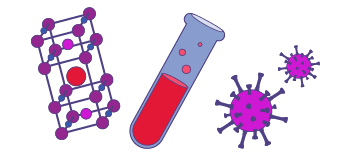In the analysis of mixtures of small molecules – e.g. in metabolomics studies - 13C detection offers several advantages over 1H detection: signal from carbon backbone is observed directly and includes quaternary atoms, greater dispersion (200 ppm vs 10 ppm) allows a more accurate peak assignment, and lower natural abundance (1.1% vs 100%) results in simpler peaks. The latter however also results in significantly lower 13C sensitivity exacerbated by its lower gyromagnetic ratio compared to 1H.
The 1.5 mm ultra-high sensitivity 600 MHz solution probe utilizes resonators made from the high temperature superconducting (HTS) material in the form of a highly oriented thin film deposited on a sapphire substrate. The film is patterned into a resonator of the size and shape needed for NMR, and in most cases provides significantly greater sensitivity than normal metal.
HTS probes are technically challenging to build, yet offer unrivaled sensitivity, enabling applications in structural biology, metabolomics, and fluxomics, that are otherwise very difficult to accomplish with current technology.
A unique 1H-13C probe is now available at the Magnet Lab Tallahassee headquarters. The 1.5 mm 13C-optimized probe is built with commercial cryogenic probe body. The probe achieves an ASTM sensitivity of 526 for a total sample volume of 35 μL.
The probe was originally developed in collaboration with Arthur Edison and in partnership with Varian Inc/Agilent Technologies. The sensitivity has been further improved with support from the NIH-funded National Resource for Advanced NMR Technology. Please visit Resource webpage for information on HTS probe technology development and its capabilities or to start a collaboration. Visit Magnet Lab User Resources to request access to the probe.
The following spectrometers are available for this technique:
The following probes are available for this technique:
Please follow Magnet Lab policy on reporting products (publications, talks, thesis) via User Reporting System and acknowledging the use of Magnet Lab facilities in publications, presentations, etc.
In addition, for data acquired using 1.5 mm 1H–13C all-HTS Cold Probe, users should include the following acknowledgement: “Technology development for the 1.5 mm ultrasensitive NMR probe is supported by the National Resource for Advanced NMR Technology funded by the National Institutes of Health through grant RM1 GM148766.”

Explore our magnet schedule to see what exciting research is happening on our stellar fleet of instruments right now.
Last modified on 20 November 2024